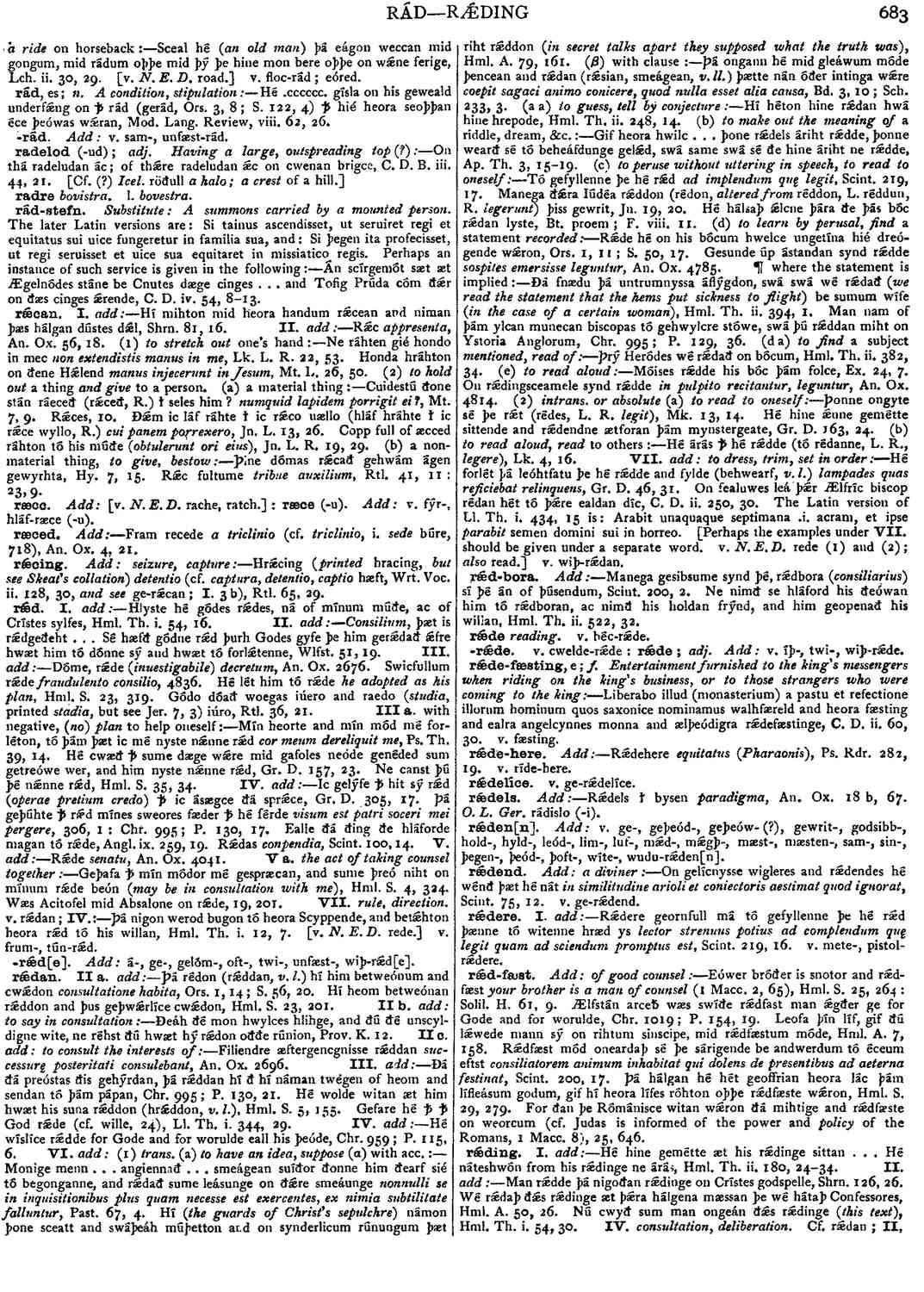rǽdan
- verb
-
Þá rédon (rǽddan, v. l.) hí him betweónum and cwǽdon
consultatione habita,
- Ors. 1, 14; S. 56, 20.
-
Hí heom betweónan rǽddon and þus geþwǽrlíce cwǽdon, Hml. S. 23, 201. II b. add: to say in consultation :-- Ðeáh ðé mon hwylces hlihge, and ðú ðé unscyldigne wite, ne réhst ðú hwæt hý rǽdon oððe rúnion, Prov. K. 12. II c. add: to consult the interests of :-- Filiendre æftergencgnisse rǽddan
successurę posteritati consulebant,
- An. Ox. 2696.
-
Ðá ðá preóstas ðis gehýrdan, þá rǽddan hí ð hí náman twégen of heom and sendan tó þám pápan,
- Chr. 995; P. 130, 21.
-
Hé wolde witan æt him hwæt his suna rǽddon (hrǽddon,
v. l.
),- Hml. S. 5, 155.
-
Gefare hé ꝥ ꝥ God rǽde (cf. wille, 24),
- Ll. Th. i. 344, 29.
-
Hé wíslíce rǽdde for Gode and for worulde eall his þeóde,
- Chr. 959; P. 115, 6.
-
Monige menn . . . angiennað. . , smeágean suíðor ðonne him ðearf sié tó begonganne, and rǽdað sume leásunge on ðǽre smeáunge
nonnulli se in inquisitionibus plus quam necesse est exercentes, ex nimia subtilitate falluntur,
- Past. 67, 4.
-
Hí (the guards of Christ's sepulchre) námon þone sceatt and swáþeáh múþetton and on synderlicum rúnungum þæt riht rǽddon (
in secret talks apart they supposed what the truth was),
- Hml. A. 79, 161.
-
Þá ongann hé mid gleáwum móde þencean and rǽdan (rǽsian, smeágean, v. ll.) þætte nán óðer intinga wǽre coepit sagaci animo conicere, quod nulla esset alia causa, Bd. 3, 10; Sch. 233,3. (a a)
to guess, tell by conjecture
:-- Hí héton hine rǽdan hwá hine hrepode,- Hml. Th. ii. 248, 14.
-
Gif heora hwilc . . . þone rǽdels áriht rǽdde, þonne wearð sé tó beheáfdunge gelǽd, swá same swá sé ðe hine áriht ne rǽdde,
- Ap. Th. 3, 15-19.
-
Tó gefyllenne þe hé rǽd
ad implendum quę legit,
- Scint. 219, 17.
-
Manega ðǽra Iúdéa rǽddon (rédon, altered from réddon, L. réddun, R.
legerunt)
þiss gewrit,- Jn. 19, 20.
-
Hé hálsaþ ǽlcne þára ðe þás bóc rǽdan lyste,
- Bt. proem; F. viii. 11.
-
Rǽde hé on his bócum hwelce ungetína hié dreógende wǽron,
- Ors. 1, 11; S. 50, 17.
-
Gesunde úp ástandan synd rǽdde sospites emersisse leguntur, An. Ox. 4785. ¶ where the statement is implied :-- Ðá fnædu þá untrumnyssa áflýgdon, swá swá wé rǽdað (we read the statement that the hems put sickness to flight) be sumum wífe (
in the case of a certain woman),
- Hml. Th. ii. 394, 1.
-
Man nam of þám ylcan munecan biscopas tó gehwylcre stówe, swá þú rǽddan miht on Ystoria Anglorum, Chr. 995; P. 129, 36. (d a) to find a subject
mentioned, read of
:-- Þrý Heródes wé rǽdað on bócum,- Hml. Th. ii. 382, 34.
-
Móises rǽdde his bóc þám folce,
- Ex. 24, 7.
-
On rǽdingsceamele synd rǽdde
in pulpito recitantur, leguntur,
- An. Ox. 4814.
-
Þonne ongyte sé þe rǽt (rédes, L. R.
legit),
- Mk. 13, 14.
-
Hé hine ǽnne gemétte sittende and rǽdendne ætforan þám mynstergeate,
- Gr. D. 163, 24.
-
Hé árás ꝥ hé rǽdde (tó rédanne, L. R.,
legere),
- Lk. 4, 16.
-
Hé forlét þá leóhtfatu þe hé rǽdde and fylde (behwearf,
v. l.) lampades quas reficiebat relinquens,
- Gr. D. 46, 31.
-
On fealuwes leá þǽr Ælfríc biscop rédan hét tó þǽre ealdan díc,
- C. D. ii. 250, 30.
- The Latin version of Ll. Th. i. 434, 15 is: Arabit unaquaque septimana .i. acram, et ipse parabit semen domini sui in horreo.
Bosworth, Joseph. “rǽdan.” In An Anglo-Saxon Dictionary Online, edited by Thomas Northcote Toller, Christ Sean, and Ondřej Tichy. Prague: Faculty of Arts, Charles University, 2014. https://bosworthtoller.com/57053.
Checked: 0